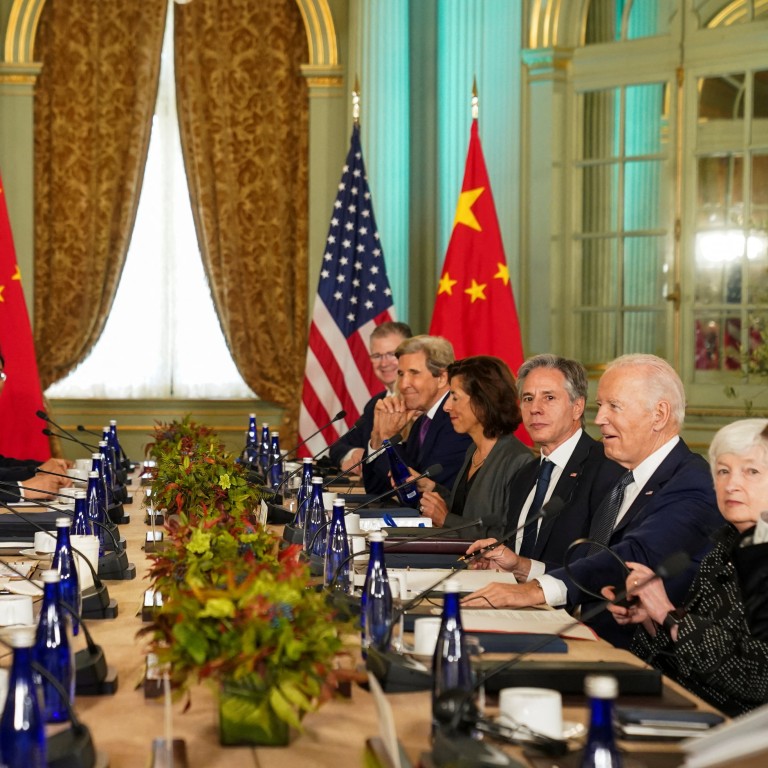
Policy advisers are urging Beijing to remain open-minded and focus on restoring investor confidence as China braces for more geopolitical tensions this year against the backdrop of elections in the United States and European Union.
While November’s summit between presidents Joe Biden and Xi Jinping in California helped stabilise relations between their respective countries, it is unclear whether such progress will garner Biden many “brownie points” with voters in the 2024 US presidential election, according to Zhang Wenzong, deputy director and research professor of Institute of American Studies at the China Institutes of Contemporary International Relations.
“The uncertainty caused by the [US] election is a risk to Sino-US relations. If Republicans return to the White House in 2025, China needs to prepare in advance to deal with new challenges,” Zhang said in a blog post published on Thursday by China-US Focus, an online forum run by the Hong Kong-based China-United States Exchange Foundation.
Policy advisers from China’s Peking and Tsinghua universities have advocated for Beijing to take a “rational” approach when it comes to managing competition with the US in 2024 – a year of elections across the globe.
Their recommendations have also come amid Beijing’s efforts to retain its market allure to global investors and restore investor confidence to counter the pressure of de-risking moves by the US-led West, and of increasing geopolitical complications.
Beijing’s tightening grip on national security, as well as inconsistencies in policies, have also sent chills down the spines of investors and businesspeople, while fuelling concerns over whether Beijing can sustain strong economic growth this year.
Yao Yang, a professor and dean at the National School of Development and director of the China Centre for Economic Research at Peking University, said China should not let competition with the US get in the way of directly engaging with Washington to discuss new rules and policy changes.
Beijing has deemed Washington’s tariffs on Chinese goods and tech restrictions as “unilateral bullying” and “unreasonable suppression”, while the US has accused China of “unfair” trade practices and “economic coercion” that have come at the expense of American jobs.
“We should look at the West as its equal,” Yao said in an interview with NetEase News last month, adding that both sides should refrain from finger-pointing and playing the blame game, and instead strive to better understand one another.
He also noted how America’s industrial base has already been hollowed out – a reference to the deterioration of the US’ manufacturing sector that has transpired over several years as producers increasingly opted for low-cost facilities overseas.
“How can it possibly compete [with China]? The United States has obviously made a strategic mistake,” Yao said.
Yao later wrote in a blog post on January 12 that China has to do more than release a few policy documents to restore investor confidence amid rising competition with the US. Such a task requires a stronger economy and the cultivation of more demand, Yao said.
“In my opinion, there is no need for us to be so nervous [about competing with the US]. China does not necessarily have to be the best in the world at everything,” Yao said in the blog post published by the Economists 50 Forum, a Beijing-based think tank.
A report by Tsinghua University published earlier this month also recommended that Beijing avoid reacting to election candidates that take a “hostile” stance toward China.
Beijing also needs to demonstrate its long-term commitment to supporting the private sector with concrete “actions” to restore confidence among the nation’s businesses, the Tsinghua report said on January 8.
On Wednesday, the Mercator Institute for China Studies (Merics), a Berlin-based think tank, published the results of a survey of 650 China experts and observers. About two-thirds thought that, while 2024 holds significant uncertainties for policies on China as a result of EU and US elections, the “securitisation of everything, with the trade-off of growth and infliction of social costs” was the most likely course for the Chinese government to take in 2024.
“Pragmatism [in China] is unlikely to make a comeback, with only 22 per cent of respondents expecting such a shift,” Merics said.
News Related